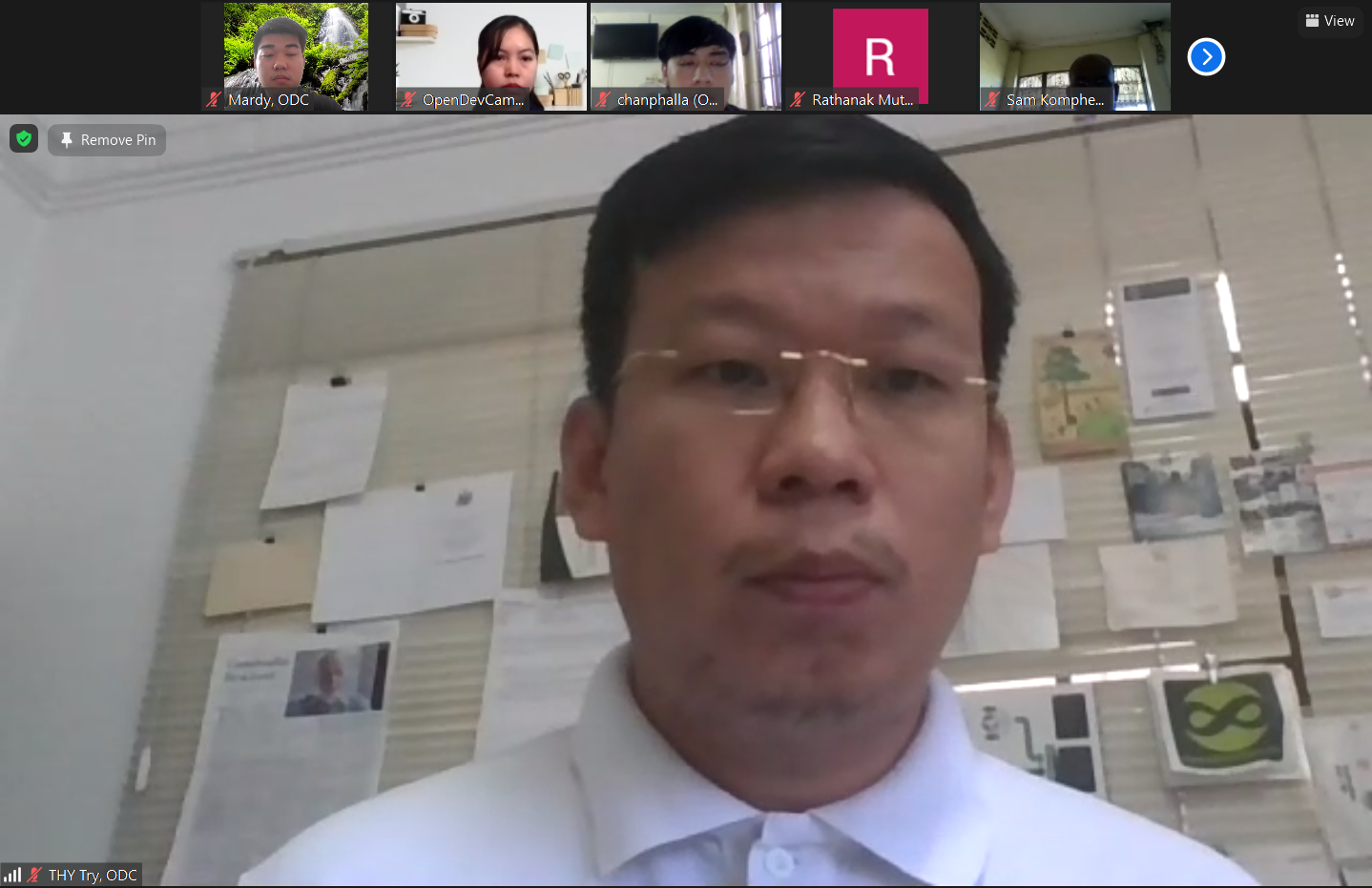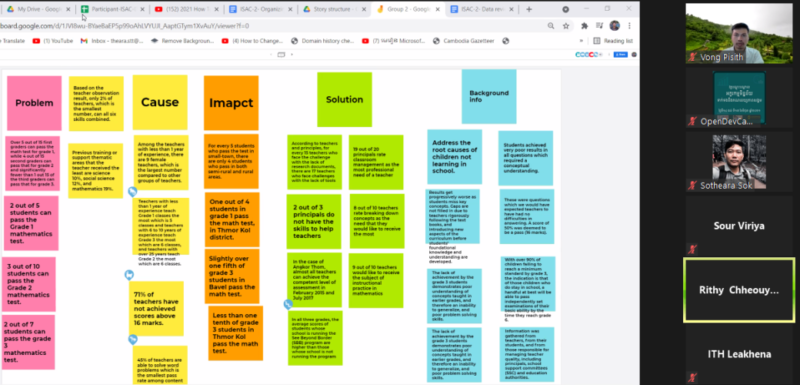សិក្ខាសាលាបណ្តុះបណ្តាលពីចម្ងាយស្តីពី អក្ខរកម្មទិន្នន័យអំពីគណនេយ្យភាពសង្គម
នៅថ្ងៃទី១៤ ដល់ ថ្ងៃទី១៧ ខែមិថុនា ឆ្នាំ២០២១ អង្គការទិន្នន័យអំពីការអភិវឌ្ឍ (អូឌីស៊ី) បានរៀបចំសិក្ខាសាលាបណ្តុះបណ្តាលពីចម្ងាយរយៈពេលបួនថ្ងៃស្តីពី អក្ខរកម្មទិន្នន័យអំពីគណនេយ្យភាពសង្គម បានដោយជោគជ័យ។ ដោយសារការរីករាលដាលនៃជំងឺកូវីដ-១៩ សិក្ខាសាលារយៈពេលបួនថ្ងៃនេះត្រូវបានធ្វើឡើងតាមរយៈប្រព័ន្ធវីដេអូអនឡាញ «Zoom» និងមានអ្នកចូលរួមសរុបចំនួន១៦នាក់ដែលពួកគាត់គឺមកពីស្ថាប័នផ្សេងៗគ្នា។ អ្នកចូលរួមទាំងគឺជាបុគ្គលិកនៅអង្គការសង្គមស៊ីវិលដែលធ្វើការលើគណនេយ្យភាពសង្គម។
សិក្ខាសាលានេះ ត្រូវបានរៀបចំឡើងក្នុងគោលបំណងបណ្តុះបណ្តាលអ្នកចូលរួមនូវមូលដ្ឋានគ្រឹះក្នុងការបរិយាយរឿងដោយប្រើប្រាស់ទិន្នន័យ ដើម្បីឱ្យទិន្នន័យនោះបានដល់ទស្សនិកជនទូទៅតាមរយៈការពង្រឹងការបរិយាយរឿងដោយប្រើប្រាស់ទិន្នន័យ និងប្រើប្រាស់ភាសាសាមញ្ញ លើកកម្ពស់ការសម្រេចចិត្តដែលទាក់ទងទៅនឹងគណនេយ្យភាពសង្គម និងគោលនយោបាយសាធារណៈនៅកម្ពុជា។
អំឡុងពេលនៃសិក្ខាសាលា អ្នកចូលរួមត្រូវបានបណ្តុះបណ្តាលអំពីការស្វែងរកទិន្នន័យពាក់ព័ន្ធនឹងការងាររបស់ពួកគាត់ បង្កើនការគិតស៊ីជំរៅ និងដំណើរការរៀបចំចាត់ចែង។ បន្ថែមពីនេះពួកគាត់ត្រូវបានជំរុញឱ្យបង្កើតសំណួរ និងស្វែងរកចម្លើយតាមរយៈទិន្នន័យដែលត្រូវបានគេមើលឃើញ និងគណនាលើទិន្នន័យផ្តុំ ហើយប្រែក្លាយទិន្នន័យដែលទទួលបានទៅជាព័ត៌មានរួចរៀបចំការបរិយាយរឿងដោយប្រើប្រាស់ទិន្នន័យព្រមទាំងការសរសេរ។
វគ្គបណ្តុះបណ្តាលនេះត្រូវបានចាប់ផ្តើមដោយមានការបើកសន្ទរកថាពី លោក ធី ទ្រី ដែលជានាយកប្រតិបត្តិនៃអង្គការអូឌីស៊ី និងលោក ប៊ីស្ណុ សាពកូតា ប្រធានគម្រោងការឆ្នៃប្រឌិតថ្មីសម្រាប់គណនេយ្យភាពសង្គមនៅកម្ពុជា (ISAC) ។ បន្ទាប់ពីការបើកសន្ទរកថា អ្នកចូលរួមទាំងអស់ត្រូវបានអនុញ្ញាតឱ្យណែនាំខ្លួនទៅវិញទៅមក ដែលមានសារៈសំខាន់ក្នុងការយល់ដឹងពីគ្នាឱ្យបានកាន់តែច្បាស់ និងសេចក្តីរំពឹងទុកដែលទទួលបានពីវគ្គបណ្តុះបណ្តាលនេះ ជាពិសេសការយល់ដឹងអំពីទិន្នន័យបើកទូលាយ ព្រមទាំងតួនាទីនៃទិន្នន័យ ជំនាញក្នុងការកំណត់ប្រភពនៃព័ត៌មាន និងវិភាគដំណើររឿងដោយផ្អែកលើទិន្នន័យ។
បនា្ទប់ពីសុន្ទរកថា វគ្គបណ្តុះបណ្តាលនេះត្រូវបានចាប់ផ្តើមដោយការប្រឡងដើម្បីវាយតម្លៃពីការយល់ដឹងរបស់អ្នកចូលរួមរបស់យើងអំពីទិន្នន័យ។ បន្ទាប់ពីការធ្វើតេស្ត លោក សំអាន ម៉ារឌី មន្ត្រីជាន់ខ្ពស់ផ្នែកអភិវឌ្ឍន៍គេហទំព័រ និងព័ត៌មានវិទ្យារបស់អូឌីស៊ីបានចាប់ផ្តើមជាមួយនឹងការពន្យល់ពីមូលដ្ឋាននៃការប្រសព្វរបស់ទិន្នន័យ ដំណើររឿង និងគោលការណ៍ ហើយបានបន្តដោយលោក បាន ចន្ទផល្លា អ្នកស្រាវជ្រាវ ផ្នែកអភិវឌ្ឍន៍សង្គមរបស់អូឌីស៊ីអំពីការយល់ដឹងមូលដ្ឋានអំពីទិន្នន័យ។
បន្ទាប់ពីការសម្រាកបន្តិចមក លោក វង្ស ពិសិទ្ធ មន្ត្រីជាន់ខ្ពស់ផ្នែកស្រាវជ្រាវទិន្នន័យ និងប្រព័ន្ធព័ត៌មានភូមិសាស្ត្រ(GIS)នៃអូឌីស៊ីបានចាប់ផ្តើមបន្តវគ្គបណ្ដុះបណ្ដាលនេះជាមួយនឹងលំហាត់មួយចំនួនចាប់តាំងពីពេលព្រឹក ដោយបំបែកអ្នកចូលរួមទៅតាមបន្ទប់នីមួយៗ (Break out room)។ នៅចុងបញ្ចប់នៃវគ្គបណ្តុះបណ្តាលថ្ងៃទីមួយ លោក ឡុច កល្យាណ ដែលជាអ្នកស្រាវជ្រាវទិន្នន័យ និង ឯកទេសប្រព័ន្ធព័ត៌មានភូមិសាស្ត្រ(GIS) បានបង្ហាញពីដំណើរការនៃការស្វែងរកទិន្នន័យជាមួយនឹងលំហាត់តូចៗមួយចំនួននៅចុងបញ្ចប់។
នៅថ្ងៃទី១៥ ខែមិថុនា ដែលជាថ្ងៃទីពីរ នៃការបណ្តុះបណ្តាលនេះ លោក កល្យាណ បានស្វាគមន៍អ្នកចូលរួមជាមួយនឹងលំហាត់ខ្លះៗពីការស្វែងរកទិន្នន័យដែលបានពន្យល់កាលពីថ្ងៃទីមួយ ដើម្បីរំលឹកឡើងវិញនូវព័ត៌មានមួយចំនួនមុនពេលបន្តវគ្គបណ្តុះបណ្តាលទៅមុខទៀត។ បន្ទាប់មកលោក ពិសិទ្ធ បានធ្វើបទបង្ហាញទាក់ទងនឹងការសម្ភាសន៍ទិន្នន័យម្តងមួយជំហានៗ។ ដោយសារតែវគ្គនេះមានសារៈសំខាន់ខ្លាំងសម្រាប់ការបណ្តុះបណ្តាលទាំងមូល លោក ពិសិទ្ធ បានសំរេចដាក់នូវលំហាត់ជាច្រើនដល់អ្នកចូលរួម តាំងពីព្រឹករហូតដល់ចុងបញ្ចប់នៃថ្ងៃទីពីរ។
នៅថ្ងៃទី១៦ ខែមិថុនា ដែលជាថ្ងៃទីបី នៃការបណ្តុះបណ្តាលលោក ពិសិទ្ធ បានចាប់ផ្តើមបង្ហាញអំពី data story recipe lab និងការធ្វើឱ្យទិន្នន័យទាំងនោះមានភាពសាមញ្ញ និងងាយយល់ ដើម្បីឱ្យទិន្នន័យរបស់យើងកាន់តែមានលក្ខណៈទាក់ទាញ និងគួរឱ្យចាប់អារម្មណ៍ដូចជាការយកមនុស្សជាប្រធាន ដូច្នេះវាងាយស្រួលជាងក្នុងការបញ្ចូលកិរិយាស័ព្ទសកម្មភាពតាមក្រោយ។ ស្រដៀងទៅនឹងវគ្គមុនដែរ លោក ពិសិទ្ធ បានបំបែកអ្នកចូលរួមទៅតាមបន្ទប់តូចៗជាមួយនឹងលំហាត់ខ្លះៗ ហើយបន្ទាប់មកបញ្ចប់វគ្គបណ្តុះបណ្តាលថ្ងៃទីបី ជាមួយកម្មវិធីអូស៊ីអភាសាខ្មែរ ដោយលោក ផល្លា។
នៅថ្ងៃទី១៧ ខែមិថុនា ដែលជាថ្ងៃចុងក្រោយនៃការបណ្តុះបណ្តាលនេះ លោក ម៉ារឌី បានពន្យល់អំពីវិធីដែលយើងអាចរៀបចំរឿងរ៉ាវដោយផ្អែកលើទិន្នន័យបាន ដែលក្នុងនោះមានដូចជា រចនាសម្ព័ន្ធនៃរឿងដោយប្រើប្រាស់ទិន្នន័យ។ អ្វីដែលសំខាន់ពីវគ្គនេះគឺ ជម្រើសនៃរចនាសម្ព័នរបស់រឿងដោយប្រើប្រាស់ទិន្នន័យដែលរាប់បញ្ចូលទាំង ពីរ៉ាមីតបញ្ច្រាស (Inverted Pyramid) ប្រៀបធៀបភាពផ្ទុយគ្នា (Compare Contrast) និងមួយជំហានម្តងទៅតាមបញ្ហា (Step-by-Step through an Issue )។ នៅចុងបញ្ចប់នៃការបណ្តុះបណ្តាលរយៈពេលបួនថ្ងៃ អ្នកចូលរួមទាំងអស់មានឱកាសក្នុងការពិភាក្សាគ្នាបន្ថែម និងការប្រឡងតាមរយៈហ្គូហ្គលហ្វម (Google Form) ដើម្បីវាយតម្លៃបន្ថែមលើការយល់ដឹងរបស់អ្នកចូលរួមបន្ទាប់ពីការបណ្តុះបណ្តាលរយៈពេលបួនថ្ងៃកន្លងមក។
តាមរយៈការបណ្តុះបណ្តាលរយៈពេល ៤ ថ្ងៃនេះ យើងអាចមើលឃើញពីការរីកចំរើនគួរឱ្យកត់សម្គាល់ក្នុងការយល់ដឹងអំពីមូលដ្ឋានគ្រឹះនៃអក្ខរកម្មទិន្នន័យអំពីគណនេយ្យភាពសង្គម ជាពិសេសតាមរយៈការប្រលងចុងក្រោយដែលអ្នកចូលរួមទាំងអស់បានធ្វើ។ សរុបមក អ្នកចូលរួមទាំងអស់បានពេញចិត្តនឹងវគ្គបណ្តុះបណ្តាលនេះ ព្រោះវាបានជួយដល់ពួកគេយ៉ាងខ្លាំងជាមួយនឹងការសិក្សា និងការងារ។






